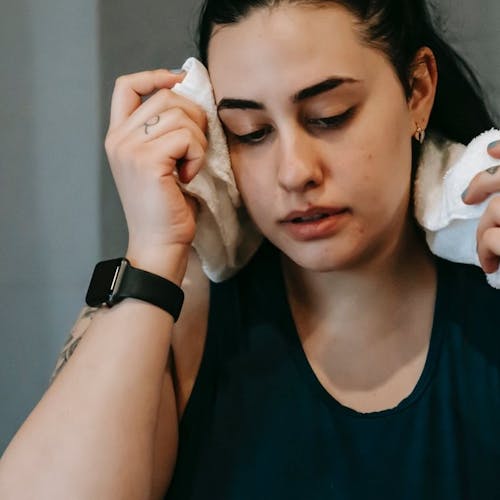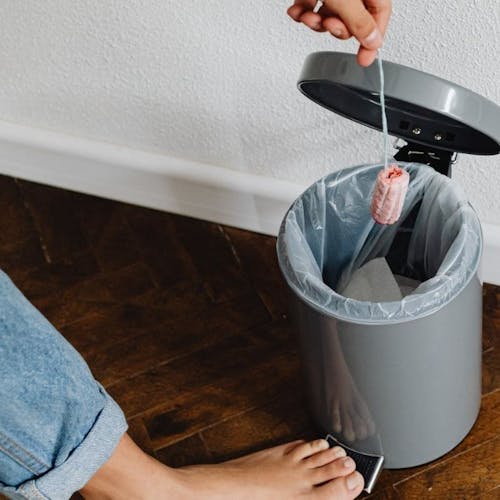This website uses cookies to enhance the user experience. By using Yoppie you are agreeing to our use of cookies.
Managing Periods With A Disability
Written by Yoppie
18 Sep 2020
Physical disabilities and periods
Intellectual disabilities and periods
Periods are a common thread connecting us through all walks of life. That said, no two periods are the same, just as no two people are the same. Disabilities present differently for each person, so whether you have a physical or an intellectual disability, you may find that the traditional period advice doesn’t exactly apply to you.
Let’s start by clarifying what we mean by ‘disability’ - it’s a broad term. The dictionary definition is “a physical, mental, cognitive, or developmental condition that impairs, interferes with, or limits a person's ability to engage in certain tasks or actions, or participate in typical daily activities and interactions”.
For some with disabilities, managing their period might be no problem at all, but for others, the simple act of changing a tampon could be something that requires much more forethought and creativity than the rest of us apply to the task.
Physical disabilities and periods
There’s a wide spectrum of physical disabilities, and within each category, individual abilities vary. It could take us an entire book to list all possible types of physical disability, so here are just a few examples; multiple sclerosis, spinal cord injury, epilepsy, visual impairment, cerebral palsy, limb amputation, and more.
Some barriers often faced by those with a disability include:
- Lack of educational materials that cover advice for women with different abilities and body types
- Accessing the right support and answers
- Insufficient infrastructure in public bathrooms to aid all abilities, which can make basic hygiene procedures more challenging and increase risk of health problems
According to menstrualhygieneday.org, although people with physical disabilities can experience menstruation in much the same way as non-disabled women, they are often found to have more negative symptoms such as heavy periods (menorrhagia) and painful periods (dysmenorrhoea).
The management of menstruation can prove difficult for some with limited physical functions. After all, tampons can be a fiddly business at the best of times! Though applicators can make things slightly easier, inserting and removing one, or doing the same for a menstrual cup, just isn’t an option for some. Plus, those who have the help of a carer for hygiene may not feel comfortable with someone else doing this.
In many cases, sanitary towels (and perhaps period-proof underwear) are the best choice, though they can still be challenging to change. They present a less intrusive option for carers, and can be essential for those who do not have sensation below the waist and therefore can’t always tell when their period is on its way, or already there.
We love this account by writer Melissa Blake, who talks about the logistics of getting her period while in a wheelchair.
Intellectual disabilities and periods
Some disabilities you can’t see, and when it comes to intellectual disabilities such as Down syndrome, Prader-Willi syndrome, developmental delay, and more, women and girls are up against a number of barriers that make menstruation a stressful experience. These include a lack of ability to gather information on periods, lack of educational materials that cater to varying learning requirements, and sometimes a lack of understanding about what is happening to their body.
Many of us have grown accustomed to our periods and can handle them on autopilot, but if you actually think about what goes into managing them, there’s a lot! Some steps include keeping track of when it’s due, being prepared with appropriate sanitary products, changing the products (which can be messy!), disposal of used products, knowing about things like toxic shock syndrome (TSS), dealing with laundry when inevitable leaks happen, pain relief for cramps, remembering the correct daily intake of birth control pills to manage symptoms, and of course, there’s low mood and mood swings, which can be even more difficult for someone with an intellectual disability.
Typically, if someone is independent with their toileting, they are usually also able to manage their menstrual care, however this isn't always the case. Still, it can be useful for carers or family members to track the periods of those with disabilities to ensure they are always healthy, since your menstrual cycle can be an indicator of other health problems, and those with intellectual disabilities may not recognise tell-tale signs or feel comfortable sharing them to seek help.
Tracking allows the person to be prepared for their next period, and can even help manage the symptoms of their disability. As an example, up to 20% of people with intellectual disabilities also have epilepsy, and seizures can be linked to hormonal changes in the menstrual cycle. By tracking this, carers can monitor the likelihood of issues.
Whatever difficulties you face with puberty, periods, and the emotions that come with them, you can be sure that most girls and women have experienced the highs and lows (well, mostly lows!) of periods, and that’s something that will always unite us - making it forever acceptable to ask a stranger for an emergency sanitary towel!
Do you have a disability, or care for someone with a disability? We’d love to hear your thoughts and stories on managing periods - you can chat to us over on Instagram at @itsyoppie or in our private FB group. Whatever your particular circumstances, you've got enough going on at that time of the month so don't forget that our personalised period subscription box can get organic cotton tampons, PMS supplements, and much more, all delivered through your letterbox. That's a few less things to worry about each cycle!
Fact checked by Doctor Samantha Miller.
Section jump
Back to top
Subscribe To Our Newsletter
YOPPIE





© 2026 Yoppie is a registered trademark of Phlo Technologies Ltd.
Yoppie's supplements are not a substitute for a varied diet and healthy lifestyle and are not intended to diagnose, treat, or cure any disease. If you are pregnant, breastfeeding, have a medical condition or are under medical supervision, please consult with your doctor before taking any of our products.






